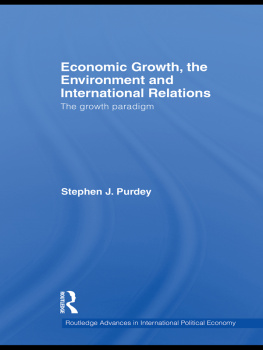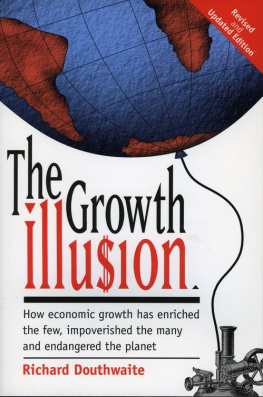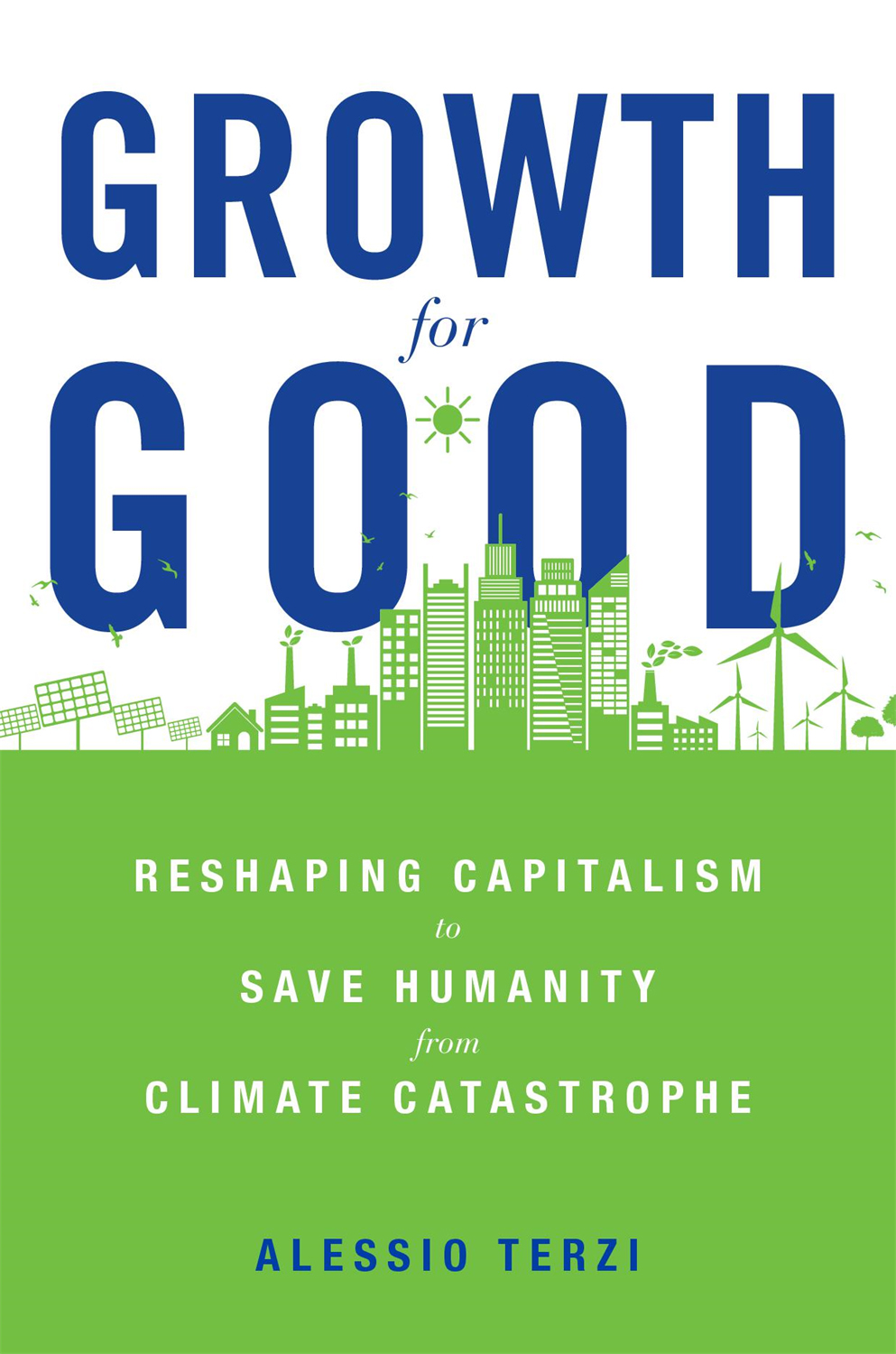Contents
List of Figures
List of Tables
Guide
Pagebreaks of the print version
GROWTH for GOOD
Reshaping Capitalism to Save Humanity from Climate Catastrophe
ALESSIO TERZI
HARVARDUNIVERSITYPRESS
Cambridge, Massachusetts London, England
2022
Copyright 2022 by the President and Fellows of Harvard College
All rights reserved
Design by Tim Jones
978-0-674-25842-6 (cloth)
978-0-674-27632-1 (EPUB)
978-0-674-27633-8 (PDF)
The views expressed herein are those of the author and do not necessarily reflect the official opinion of the European Commission.
The Library of Congress has cataloged the printed edition as follows:
Names: Terzi, Alessio, author.
Title: Growth for good : reshaping capitalism to save humanity from climate catastrophe / Alessio Terzi.
Description: Cambridge, Massachusetts : Harvard University Press, 2022. | Includes bibliographical references and index.
Identifiers: LCCN 2021051705
Subjects: LCSH: Economic developmentEnvironmental aspects. | Global warmingEconomic aspects. | Green movement. | Fossil fuelsEconomic aspects. | Capitalism.
Classification: LCC HD75.6 .T47 2022 | DDC 333.7dc23/eng/20211208
LC record available at https://lccn.loc.gov/2021051705
To my parents, Fiorella and Mario, who taught me the fine balance between taking responsibility for ones destiny, and at the same time honoring the hard work and personal sacrifices of those who came before us.
Contents
Like many good stories, this one starts around a dinner table, specifically on a Roman terrace. The date was 2007. I was just turning twenty and had recently started an undergraduate program in economics in Milan. The hosts were a couple of old family friendsboth consummate intellectuals from a left-leaning traditionand I had been given the chance to tag along with my parents. Respecting the standard Italian dinner script with clockwork precision, between the first and the second course the conversation veered toward politics, the dire state of the economy, and what the government needed to do to get the country out of its impasse.
By the time of the digestif, I had pulled out my basic economics toolkit and was parroting the conventional policy recommendations I had heard so many times in university classes. Italy needs to implement structural reforms that will boost economic growth was my main contribution to the debate. At this point, and to my shock, Giorgiothe hostturned my world upside-down by proclaiming, We need to stop growing! As my friend Serge always says, we need to degrow! At the time, I had no idea who Serge was. Only years later would I discover that Giorgios reference was to the French intellectual Serge Latouche, one of the masterminds behind the decroissance, or degrowth, movement. On that note, moved by some paternal protective spirit, my father declared the end of the discussion with the Italian code word eh vabb, and we left shortly thereafter.
Nonetheless, Giorgios words echoed in my mind for years, laying the seed of doubt and therefore of inquiry into what I otherwise saw as a given, both in my economics classroom and in the public debate. Do we actually need economic growth? And, to begin with, what is growth? Since then, I have devoted most of my academic and professional career to exploring these questions, and issues related to economic growth more broadly, in both theory and practice. In many ways, this book is the culmination of these reflections, and the manual I wish I could have read early on in my economics undergraduate course.
In the 1980s, economist Robert Lucas was prodded by the extreme differences in countries growth rates to pursue a general theory for economic development. He wondered: Could government actions in a slow-growth nation allow it to match the growth rates of a fast-growing one? If not, what in the first countrys nature prevented that? The consequences for human welfare involved in questions like these are simply staggering, he mused in a 1985 Marshall Lecture at Cambridge University. Once one starts to think about them, it is hard to think about anything else. My own passion for understanding the nature, drivers, and consequences of economic growth has even deeper roots. Coming from a family of scientists, I strongly recognize that to contribute to improving society is to stand on the shoulders of past discoverers and benefit from past accumulation of knowledge.
As it turns out, decrypting the secrets of the accumulation of wealth allows us to understand much else about the world. Questions about growth are deeply interwoven with some of the most important perennial puzzles across social sciences. They link to the theories of value that kept so many classical economists busy from the eighteenth century onward, including Adam Smith, David Ricardo, and Karl Marx. Digging even deeper into history, they link to the interplay between the quest for happiness and the accumulation of material possessions, power, and profit that philosophers have reflected on at least since 380 BCE, when Platos Gorgias narrated a dispute on the topic between Socrates and Callicles. Social tensions within countries, and therefore large parts of national politics, are ultimately clashes over distributions of proceeds of economic growth and the power imbalances that these generate.
Likewise, the resources made available by economic growth, accumulated over time, can help explain the power relations between countries. The turn to industrialization and the rise of the West, considered by some to be the most consequential developments of the last five hundred years, are a story of unprecedented acceleration in economic growth that changed the course of global history. The recent rise of China can be read along similar lines. Geopolitical power and economic growth go together. Naturally, there is another side to the same coinmeaning the continued poverty of many nations and mass migrationwhich also demands explanations of why economic growth and material progress have not taken off to a similar extent elsewhere in the world. Finally, thinking about economic growth does not matter only to understanding the past or the present. As we will see, growth is tightly linked to scientific and technological progress, what humans are and will be capable of doingin other words, it matters to humanitys future.
In light of all this, it will be evident that the ideas, paradoxes, and principles contained in this book have been brewing in my mind for now over a decade. At the same time, 2020 marked a turning point. The year before, upon rejoining EU institutions after my PhD, I had started working on economic questions related to the European Green Dealthe flagship project of the freshly minted Von der Leyen Commission to make Europe the first climate-neutral continent in the world. It was, however, the Covid-19 pandemic that prodded me toward further work related to economic growthnamely, to investigate its relationship to changes in climate, the environment, and nature more broadly. As economies were brought to a grinding halt by lockdown measures aimed at containing the virus, the general feeling was that nature started to heal after decades of abuse at the hands of an industrial society. In 2020, global CO2 emissions dropped at the fastest clip since World War II, suggesting to many that actively shrinking an economy could perhaps be part of the strategy to combat climate change. This hope was encouraged as images circulated on social media of animals flourishing with the retreat of human activity. The inauthenticity of some of these notwithstanding (dolphins were not swimming in Venices canals), seeing them led me to wonder: Is it the economy





